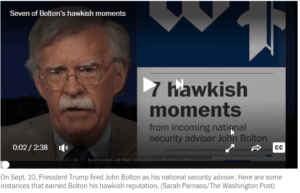 The Washington Post
The Washington PostPresident Trump announced Tuesday that John Bolton was no longer his national security adviser, saying in tweets that he “disagreed strongly with many of his suggestions” and that Bolton was no longer needed.
The two men offered differing accounts about whether Trump had forced Bolton out of the position or whether Bolton left voluntarily after repeated clashes with Trump.
“I informed John Bolton last night that his services are no longer needed at the White House,” Trump said on Twitter. “I asked John for his resignation, which was given to me this morning. I thank John very much for his service.”
Trump said he would name a replacement next week, as the latest upheaval in his administration played out.
Bolton, a former diplomat and political commentator who came on board in April 2018, was Trump’s third national security adviser.
Trump’s harshly worded tweet made clear that long-simmering frustration with Bolton had boiled over. Bolton immediately took issue with Trump’s assertion that he was fired, saying that he had offered his resignation.
“Let’s be clear, I resigned, having offered to do so last night,” Bolton said in a text to The Washington Post. “I will have my say in due course. But I have given you the facts on the resignation. My sole concern is US national security.”
He also responded to Trump on Twitter. “I offered to resign last night and President Trump said, ‘Let’s talk about it tomorrow’,” Bolton wrote.
Bolton was scheduled to appear alongside Secretary of State Mike Pompeo at a White House briefing later Tuesday. Trump’s announcement came less than two hours before that event.
Bolton’s relationship with Pompeo had become increasingly tense in recent months, with Bolton privately accusing Pompeo of spending too much time furthering his own political ambitions and Pompeo arguing that Bolton’s inflexibility and hard line views were corrosive.
Bolton’s departure had been rumored on and off for months, and Trump himself had joked about it earlier this year, saying he appreciated hearing Bolton’s views even though he often disagreed with them.
Ironically, Bolton’s departure came on the heels of what was perceived as a Bolton victory against Pompeo, his most formidable adversary inside the administration — the rejection of a peace deal in Afghanistan with the Taliban negotiated by Pompeo’s State Department.
[Collapse of Afghanistan peace talks spotlights internal Trump administration divisions]
Bolton had argued against the U.S.-Taliban negotiations for months, saying that the Taliban could not be trusted and that Trump could achieve his chief aim in Afghanistan — the withdrawal of U.S. troops — without any agreement with the militants.
Trump announced late Saturday that he was canceling a previously secret meeting with the Taliban and Afghan President Ashraf Ghani to finalize the deal. On Monday, he said that the deal, and the negotiations, were “dead.”
Bolton recently said he did not want to appear on television to defend some of the administration’s positions, particularly on Afghanistan and Russia, according to administration officials, who requested anonymity to discuss private conversations.
Bolton irritated others by regularly asking for a large entourage to travel, which many others were frustrated by, the officials said.
Bolton and Trump had been at odds on issues of substance and style.
Bolton did not like Trump’s repeated meetings with Kim Jong Un, administration officials said, and he had argued against directly meeting with Iranians officials. He also did not like the president’s repeated insistence that Russia rejoin the Group of Seven nations.
Trump regularly mocked Bolton as a warmonger, sometimes even ticking off countries and joking that Bolton would want to invade them, current and former senior administration officials said.
Trump’s announcement of Bolton’s departure drew immediate praise from Sen. Rand Paul (R-Ky.), a member of the Senate Foreign Relations Committee.
“I commend @realDonaldTrump for this necessary action,” he wrote on Twitter. “The President has great instincts on foreign policy and ending our endless wars. He should be served by those who share those views.”
Democrats seized on the latest turnover in the administration.
“I’m legitimately shaken by the grave instability of American foreign policy today,” Sen. Chris Murphy (D-Conn.), also a member of the Foreign Relations Committee, said on Twitter. “I’m no Bolton fan, but the world is coming apart, and the revolving door of U.S. leadership is disappearing America from the world just at the moment where a stable American hand is most needed.”
That sentiment was echoed by Brett Bruen, a former State Department official who served as the National Security Council’s director of global engagement in the Obama administration.
“Trump seems to go through national security advisors faster than there are outfit changes at the Oscars,” Bruen said. “Protecting our country is about more than egos and who will deliver splashy summits. We desperately lack stability and strategy in our national security.”
Bolton was preceded by Michael Flynn and H.R. McMaster.
Flynn, a retired Army lieutenant general, resigned in February 2017 over revelations about his questionable contacts with the Russian ambassador to the United States and his misleading statements about the matter to senior Trump administration officials.
McMaster, an Army lieutenant general at the time of his hiring by Trump, was forced out in March 2018 after enduring the ire of conservatives for months and disagreeing with Trump on some key foreign policy strategies.
Robert Costa and Toluse Olorunnipa contributed to this story.







